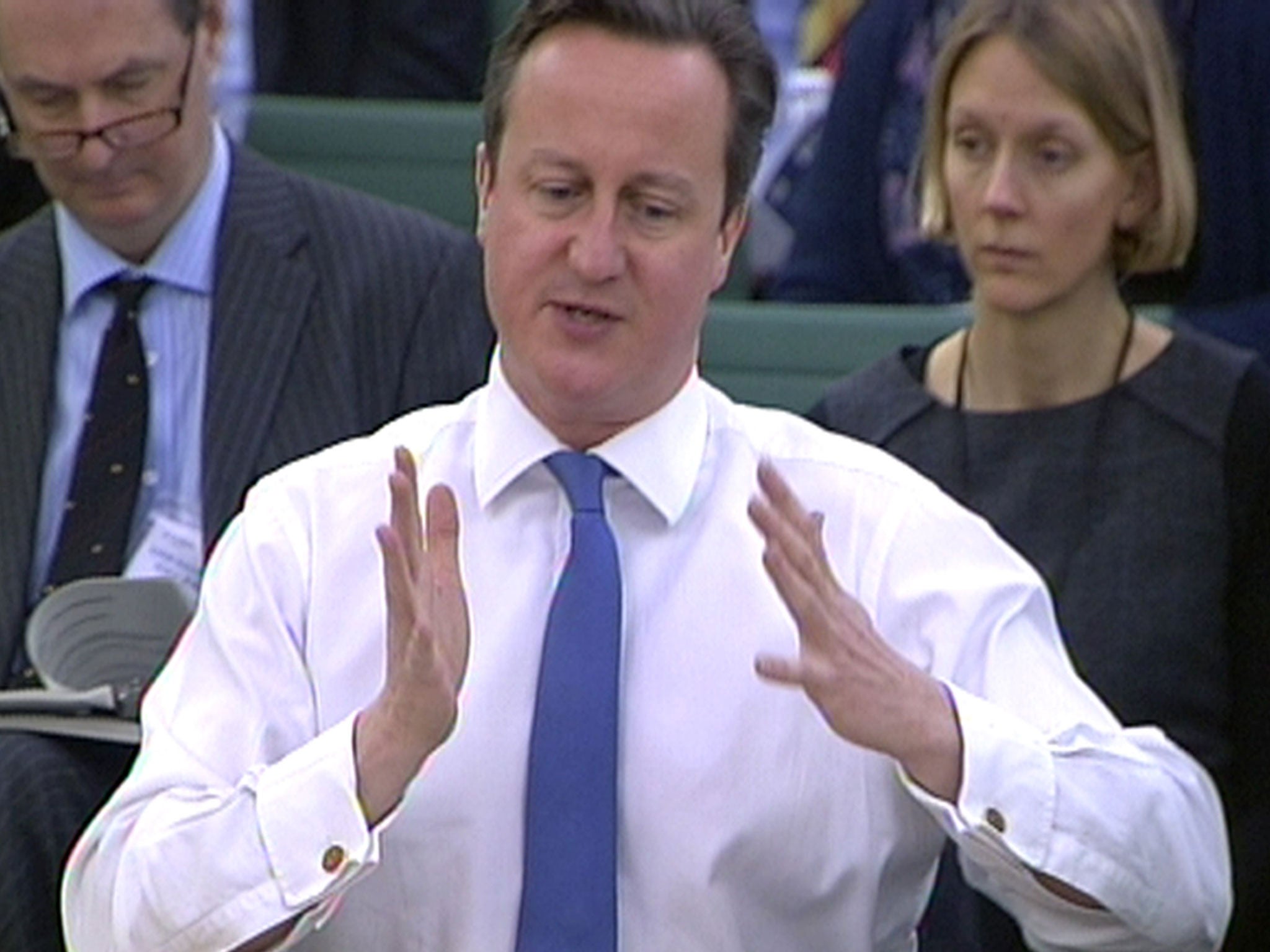David Cameron beats Conservative Immigration Bill rebellion – with the help of the Opposition
More than 80 backbenchers had demanded a tougher line on deporting foreign criminals from Britain

Your support helps us to tell the story
From reproductive rights to climate change to Big Tech, The Independent is on the ground when the story is developing. Whether it's investigating the financials of Elon Musk's pro-Trump PAC or producing our latest documentary, 'The A Word', which shines a light on the American women fighting for reproductive rights, we know how important it is to parse out the facts from the messaging.
At such a critical moment in US history, we need reporters on the ground. Your donation allows us to keep sending journalists to speak to both sides of the story.
The Independent is trusted by Americans across the entire political spectrum. And unlike many other quality news outlets, we choose not to lock Americans out of our reporting and analysis with paywalls. We believe quality journalism should be available to everyone, paid for by those who can afford it.
Your support makes all the difference.David Cameron has beat an embarrassing retreat in the face of a rebellion by more than 80 Tory MPs who voted against the Government on its Immigration Bill.
The Prime Minister’s authority was challenged by his own backbenchers as they demanded a tougher line on deporting foreign criminals from Britain.
Amid farcical scenes in the Commons, Mr Cameron had to rely on the votes of Labour MPs and his Liberal Democrat Coalition partners to defeat a revolt by 87 Tories, who voted to give ministers rather than judges the final decision on whether deportation would breach the human rights of foreign criminals.
The rebels, who included many of Mr Cameron’s fiercest Tory critics, pressed ahead despite warnings that their move would divert attention from a series of official statistics showing the economy is recovering.
Lord (Michael) Howard, the former Tory leader, had said before the vote: “What is needed in this stage of the parliament is a degree of self-discipline by Conservative backbenchers. It is very important, I think, that we present the Conservative Party as a united party in the run-up to the election.”
In an attempt to avoid a public split, Mr Cameron ordered Tory ministers to abstain – even though they admitted that the backbench plan could be illegal under the European Convention on Human Rights (ECHR).
Senior Tories admitted privately that the outcome was “chaotic” and “messy.” But allies of Mr Cameron said there was little point in a showdown with the rebels because he was “sympathetic” to the objectives of Dominic Raab, the MP who proposed an amendment to the Immigration Bill. Ministers hope a compromise plan to reflect his wishes will be drawn up during the Bill’s passage through the House of Lords.
Mr Raab said foreign criminals were using the ECHR as the “joker” to escape deportation. More than 200 successfully challenge deportation on human rights grounds each year, and about 90 per cent cite the “right to private and family life” under Article 8 of the convention.
His proposal was defeated by 241 votes to 97, a government majority of 144. The 87 Tory rebels were joined by 10 Labour MPs and two members of the Democratic Unionist Party.
Yvette Cooper, the shadow Home Secretary, called the Bill a “car crash” and accused Mr Cameron and Theresa May, the Home Secretary, of being “scared” of their own backbenchers and “losing control” of their own policy.
She told the Commons: “This was the pride and joy of their legislation and yet they have been hiding it away for months. We have had months when the Immigration Bill was nowhere to be seen, when they wouldn’t bring it back.”
Mrs May, who has criticised the courts for upholding too many appeals against deportation, said it was correct to clarify the extent of the right. She argued that there were aspects of Mr Raab’s amendment that could “weaken our ability” to deport criminals and were “incompatible” with human rights law. Ministers feared it could open the door to legal challenges.
A controversial last-minute move by the Home Secretary to strip foreign-born terrorist suspects of UK citizenship was approved by 297 votes to 34, even though it could leave them “stateless”. Ministers had hoped the plan would quell the Tory revolt but the rebels stuck to their guns.
Mrs May hit back at claims by Sarah Teather, the Liberal Democrat MP, that she was seeking a “blank cheque” to rob citizens of their rights, arguing that home secretaries would be able to render someone stateless only in “very, very specific and limited circumstances” and in strict accordance with the UK’s international obligations.
Ministers insist the move would not apply to British citizens but could see foreigners who have become naturalised citizens lose their nationality if their conduct is judged “seriously prejudicial.” People holding dual nationality can already lose their British passports.
Tim Aker, head of policy at the UK Independence Party, said Mr Cameron had “lost the plot”, adding that the only solution was to “leave the EU and leave the ECHR to take back control of these legal issues”.
Join our commenting forum
Join thought-provoking conversations, follow other Independent readers and see their replies
Comments